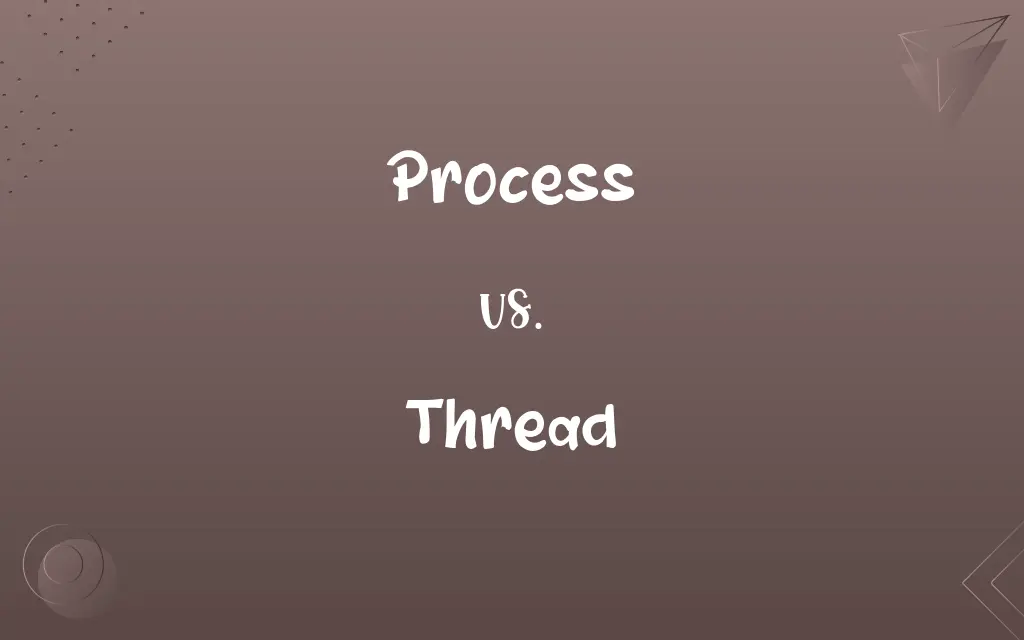Process vs. Thread: Know the Difference

By Hifza Nasir & Dua Fatima || Published on September 20, 2024
A process is an independent execution unit with its own resources, while a thread is a lightweight process sharing resources within a process.

Key Differences
Processes operate independently, each having its own memory space, ensuring data protection and security. Threads, on the other hand, share memory within a process, facilitating efficient communication and resource usage.
Dua Fatima
Sep 20, 2024
Processes have separate address spaces, isolating them from one another, threads share the address space of their parent process, leading to faster context switches and resource sharing.
Hifza Nasir
Sep 20, 2024
Creating and managing processes is resource-intensive due to their independence and isolated environment. Threads are more lightweight, making them more efficient for tasks that require frequent communication or shared data.
Hifza Nasir
Sep 20, 2024
Inter-process communication (IPC) mechanisms like pipes and sockets are necessary for processes to interact, which can be complex and slower. Threads can directly communicate through shared memory, making data exchange more straightforward and faster.
Dua Fatima
Sep 20, 2024
Processes are suitable for tasks requiring isolation and extensive computing resources, like running different applications. Threads are ideal for concurrent operations within the same application, such as handling user interface updates and background tasks simultaneously.
Dua Fatima
Sep 20, 2024
ADVERTISEMENT
Comparison Chart
Creation Overhead
High, due to separate memory and resources
Low, shares resources with the process
Dua Fatima
Sep 20, 2024
ADVERTISEMENT
Process and Thread Definitions
Process
Own address space.
A word processor runs in its own space, unaffected by other processes.
Dua Fatima
Feb 26, 2024
Thread
Lightweight execution path.
A text editor may use threads for spell-checking while typing.
Hifza Nasir
Feb 26, 2024
Process
Independent execution entity.
Opening a web browser starts a new process with its own memory and resources.
Hifza Nasir
Feb 26, 2024
Thread
Lower overhead.
Creating a new thread for background tasks is more resource-efficient than starting a new process.
Shumaila Saeed
Feb 26, 2024
Process
Inter-process communication.
Different applications communicate using IPC mechanisms like pipes.
Shumaila Saeed
Feb 26, 2024
ADVERTISEMENT
Thread
Efficient communication.
Threads within an application can quickly exchange information without IPC.
Hifza Nasir
Feb 26, 2024
Process
Isolated from others.
A crashing process does not affect the stability of other processes.
Hifza Nasir
Feb 26, 2024
Thread
Shares memory within a process.
Threads in a browser can share data, like cache, for efficiency.
Dua Fatima
Feb 26, 2024
Process
Resource-intensive.
Starting a new application involves allocating separate resources for its process.
Shumaila Saeed
Feb 26, 2024
Thread
Suited for parallel tasks.
A video game might use threads for rendering, sound, and input handling simultaneously.
Hifza Nasir
Feb 26, 2024
Repeatedly Asked Queries
Can threads within the same process communicate more easily than separate processes?
Yes, threads can communicate directly through shared memory, making it easier and faster than inter-process communication.
Shumaila Saeed
Sep 20, 2024
How do processes differ from threads in terms of memory usage?
Processes have independent memory spaces, while threads share the memory space of their parent process.
Hifza Nasir
Sep 20, 2024
What is a process?
A process is an independent execution unit with its own memory and resources, capable of running applications or tasks.
Dua Fatima
Sep 20, 2024
Why are threads considered more efficient than processes?
Threads have lower creation and management overhead because they share resources, making them more efficient for tasks that require frequent communication.
Dua Fatima
Sep 20, 2024
How does process isolation benefit system stability?
Process isolation prevents processes from interfering with each other, enhancing system stability and security.
Hifza Nasir
Sep 20, 2024
What are the disadvantages of using threads?
Threads can lead to complexities like race conditions and deadlocks if not managed correctly, due to shared resources.
Hifza Nasir
Sep 20, 2024
What is the role of IPC in processes?
IPC allows processes to exchange data and signals, necessary for coordination and communication between separate processes.
Dua Fatima
Sep 20, 2024
Why might an application use multiple threads?
Applications use multiple threads to perform concurrent tasks, like processing user input while performing background calculations.
Hifza Nasir
Sep 20, 2024
How do threads share data?
Threads share data through the shared memory of their parent process, enabling efficient data exchange and communication.
Hifza Nasir
Sep 20, 2024
Can a thread exist without a process?
No, threads are components of a process and cannot exist independently.
Shumaila Saeed
Sep 20, 2024
What is a thread?
A thread is a lightweight, executable unit that shares a process's resources, allowing more efficient task execution within the process.
Hifza Nasir
Sep 20, 2024
How does the operating system manage processes and threads?
The OS manages processes and threads by allocating resources, scheduling execution, and handling communication and synchronization.
Dua Fatima
Sep 20, 2024
What happens to the threads when a process terminates?
When a process terminates, all its threads are also terminated, as they share the same execution environment.
Hifza Nasir
Sep 20, 2024
What is the main advantage of using processes over threads?
The main advantage of processes is their isolation, which provides security and stability by preventing processes from affecting each other.
Dua Fatima
Sep 20, 2024
Can threads improve the performance of an application?
Yes, threads can significantly improve application performance by allowing parallel execution of tasks and more efficient use of resources.
Shumaila Saeed
Sep 20, 2024
Share this page
Link for your blog / website
HTML
Link to share via messenger
About Author
Written by
Hifza NasirCo-written by
Dua Fatima







































































